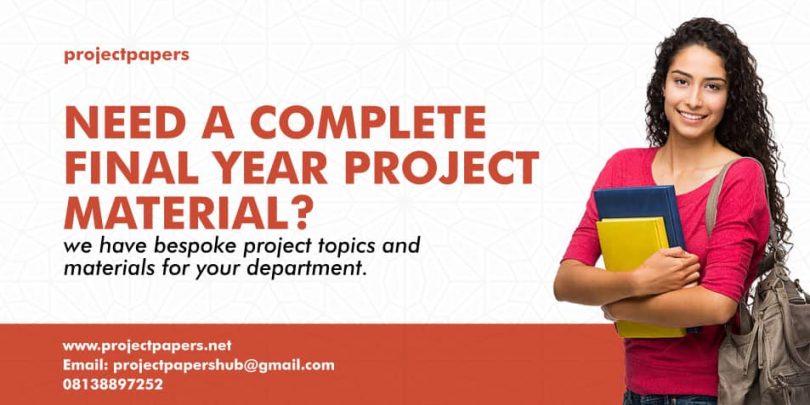Advertisements
Assessment of Siwes Relevance to Business Education Programme Objectives
Content Structure of Assessment of Siwes Relevance to Business Education Programme Objectives
The abstract contains the research problem, the objectives, methodology, results, and recommendations
- Chapter one of this thesis or project materials contains the background to the study, the research problem, the research questions, research objectives, research hypotheses, significance of the study, the scope of the study, organization of the study, and the operational definition of terms.
- Chapter two contains relevant literature on the issue under investigation. The chapter is divided into five parts which are the conceptual review, theoretical review, empirical review, conceptual framework, and gaps in research
- Chapter three contains the research design, study area, population, sample size and sampling technique, validity, reliability, source of data, operationalization of variables, research models, and data analysis method
- Chapter four contains the data analysis and the discussion of the findings
- Chapter five contains the summary of findings, conclusions, recommendations, contributions to knowledge, and recommendations for further studies.
- References: The references are in APA
- Questionnaires.
Chapter One Of Assessment of Siwes Relevance to Business Education Programme Objectives
INTRODUCTION
SIWES – the students Industrial Work Experience Scheme stands out as one ITF programme of which its relevant to students in various areas of vocational education need be appreciated. ITF in 1973/1974 established SIWES to ensure the acquisition of relevant industrial work experience by university, polytechnics and college of education students whose course are directly related to industry and to solve the problem of lack of adequate practical skills preparatory for employment in industries by Nigerian graduates of tertiary institution.
SIWES is a cooperative internship programme, which enable students of technology to spent some part of their course for relevant on-the job training practical experience in appropriate areas of the Nigerian industry. The internship programme, SIWES, can therefore be seen as that which is intended to give Nigerian students studying, occupationally related courses experience that would supplement their theoretical learning.
E-SIWES since inception the ITF has laboriously administered the scheme manually with the growing number of institutions and ever increasing populations of students who are qualified to participate. It is virtually impossible to run a hitch-free administration of the scheme manually.
SIWES data are now submitted through on-line system and payment of allowance to the students is made through e-payment. The student can now check their record with the use of www.siwesdata.org. This opens a window for each participating student and institution. Student can now verify their records entered by the institution on his or her behalf. Every student should collect password from SIWES unit in order to access this.
All relevant forms can easily be downloaded from the website. Student cannot edit the information without routing such edit requests through their institution.
The objectives of SIWES among other includes to:
- provide an avenue for students in institution of higher learning to acquire industrial skills and experience in their approved course of study.
- expose and prepare students for industrial work situation they are likely to meet after graduation.
- expose student to work methods and techniques in handling equipment and machinery that may not be available in the educational institution.
- provide student with an opportunity to apply their knowledge in real work situation thereby bridging the gap between theory and practices.
- enlist and strengthen employer’s involvement in the entire educational process of preparing student for employment in industry, and
- prepare the students for a business career by merging their analytical power with self reliance (Information and guidelines for SIWES, 2002).
Benefit of SIWES
Alabi (2009) assert that SIWES programme affords student the following opportunities:
Advertisements
- blend theoretical knowledge acquire in the classroom with practical hands-on application of knowledge.
- appreciate work method and gain experience in handling equipment and machinery which may not be available in our institution
- develop and enhance personal attributes such as critical thinking, creativity, initiative, resourcefulness leadership, time management, presentation skills and interpersonal skills.
- enhance students contacts with potential employers while on training.
- bridge the gap between the knowledge acquired in institutions and the relevant production skills required in work organizations.
- appreciate the role of professions in their various fields as the creators of change and wealth and indispensable contributors to growing the economy and national development.
- appreciate the connection between their courses of study and other related disciplines in the production of goods and services.
Ekpenyong (2008) stated that SIWES provided an avenue for evaluating participating students both as students and as prospective employees where defect are found in a students job performance or attitude to work, he/she through proper supervision guided to correct such defect prior to taking up permanent employment.
In addition to the above benefit, SIWES also provided students the opportunity to work in one or more area of industry and this will enable them to relate their theoretical knowledge to the practical work situation, which is a realistic way of determining the relevance of theory to practice.
Download Chapters 1 To 5 PDF
Advertisements


